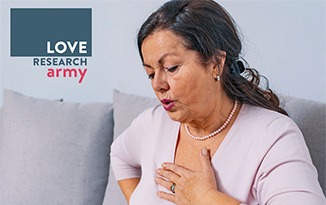
Researcher
Gary Elkins, PhD
801 Washington Avenue, 2nd Floor, Waco, TX 76701
Summary
Women with palpitations are more likely to be minority or marginalized races/ethnicities and report less physical activity, lower functional status, higher comorbidity burden, higher symptom burden, and poor quality of life. Yet, only two published studies of palpitations and additional secondary analyses by our team are relevant to breast cancer survivors. Both published studies did not report correlates of palpitations. All used only a single question to assess palpitations. The published studies and our secondary analyses reported that 15-48% of survivors experience palpitations. Palpitations can be associated with life-threatening heart rhythm disturbances, so it is crucial to better understand palpitations after breast cancer and what factors influence palpitations as a menopause symptom to identify modifiable targets for interventions.
Purpose of the Study
The purpose of this study is to examine the relationships between palpitations (e.g., a feeling of rapid, irregular, or exaggerated heartbeats) and demographic, health, attitudinal, and symptom correlates in a racially/ethnically diverse sample of breast cancer survivors. An online self-report survey will be used to collect data to understand (1) palpitations sensations, (2) palpitations frequency, severity, distress, interference, and reporting to healthcare professionals, and (3) demographic, health, attitudinal, and symptom correlates of palpitations.
We will recruit 1000 diverse adult female breast cancer survivors. Participants will be asked to complete a survey on the online Qualtrics platform and it is estimated that this survey will take approximately 15 minutes to complete. Participants will be asked to fill out a demographics and health information questionnaire, the Palpitations Assessment Tool, the SWAN Attitudes Toward Menopause Scale, the Hot Flash Interference Scale, the Hospital Anxiety and Depression Scale-Anxiety subscale, the Psychological Distress Profile, and the Insomnia Severity Index.
What does participation involve?
Participants will be asked to complete a survey on the online Qualtrics platform and it is estimated that this survey will take approximately 15 minutes to complete. Participants will be asked to fill out a demographics and health information questionnaire, the Palpitations Assessment Tool, the SWAN Attitudes Toward Menopause Scale, the Hot Flash Interference Scale, the Hospital Anxiety and Depression Scale-Anxiety subscale, the Psychological Distress Profile, and the Insomnia Severity Index.
Inclusion criteria
- Female
- Breast cancer survivor
- Peri Menopausal (past 3 months with less regular or skipped periods) or post-menopausal (no periods past 12 months) and changes or stop in meses, not due to uterine ablation or IUD
- Finished IV chemo, radiation, or surgery for breast cancer more than 1 month ago
- No History of other cancer Diagnosis
Exclusion criteria
- Male - menopause does not affect males
- Currently undergoing intravenous chemotherapy or radiation
- Surgery related to cancer in the past month
- Pregnant
- Breastfeeding
- Transgender
- Major psychiatric disorder (e.g., schizophrenia, psychosis)
- History of heart attack or congenital heart disease (present at birth)
Where?
U.S. / Virtual
How can I sign up for this study?
By clicking the registration link and completing ICF.
